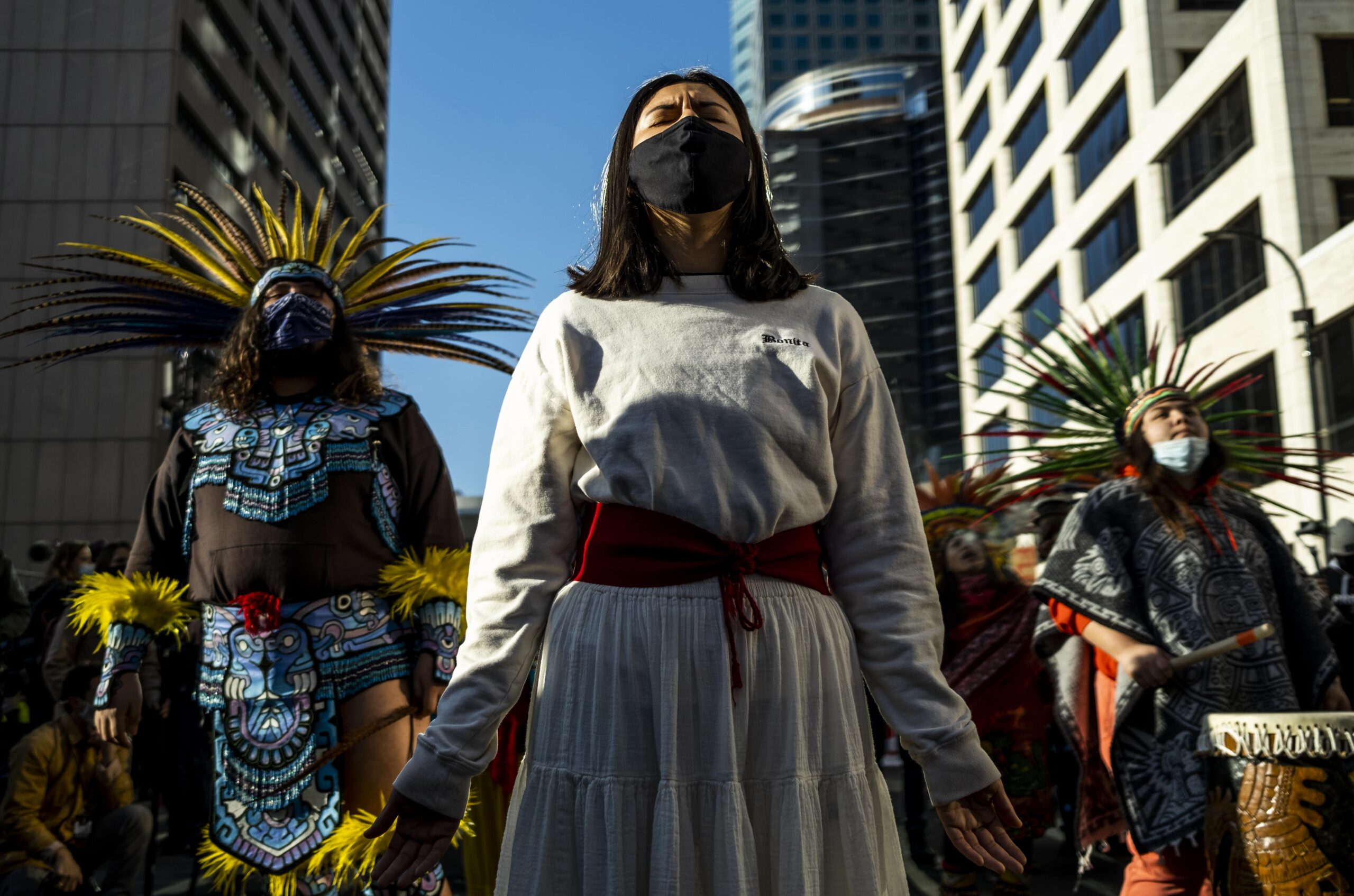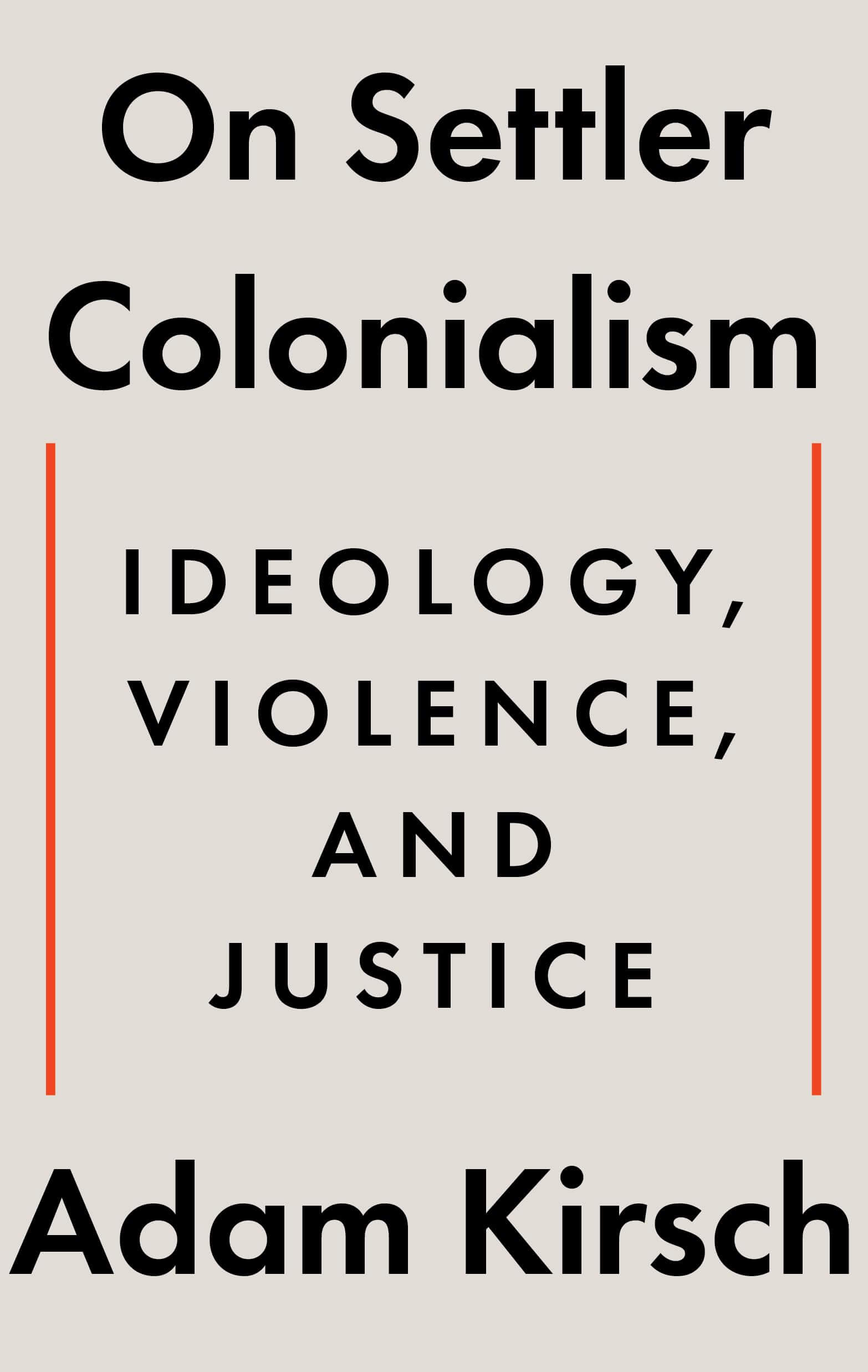Memorialized on Marx’s tombstone in London’s Highgate Cemetery is one of the most famous lines he ever wrote: “The philosophers have only interpreted the world in various ways. The point, however, is to change it.” It was a mission statement. Marx did not want merely to understand and critique bourgeois society; he wished that his work might play some part in its revolutionary overthrow. Elsewhere, he wrote that history repeats itself as farce.
In the age of the U.S.-led Western order that grew out of the Second World War, the academic discipline of sociology has periodically spawned ideological subdisciplines from its margins. They are programmatic like Marxism and unfailingly employ the vocabulary of the activist left, but they increasingly tend towards ideas that Marx himself would have regarded as deeply reactionary. None more so—as Adam Kirsch ably demonstrates in this short book—than the enterprise known as “settler colonialism studies.”
Kirsch has done an excellent job compiling and marshaling quotations from settler colonial theorists so that the reader can judge them by their own words. “Making sense,” says Sai Englert of Leiden University, of “how settler colonial processes connect to others—such as capitalism, imperialism, racism, sexism, nationalism—must also mean setting out to think through how these structures of domination can be dismantled.” Leigh Patel of the University of Pittsburgh explains her unorthodox teaching methods thus: “Protests, marches and sit-ins are forms of pedagogy . . . not carried out for the sake of awarding grades but rather, in the interest of shifting mindsets and material realities.” A popular online resource cited by Kirsch, meanwhile, explains that “settler colonialism includes interlocking forms of oppression, including racism, white supremacy, heteropatriachy, and capitalism.”
We can see from the above that theorists of settler colonialism take the Marxian view that their job is not only to study society but to change “material realities”; they hope to dismantle the familiar mélange of “structures” that those who identify as progressives typically claim to oppose. But how do these theorists actually define what settler colonialism is?
According to Patrick Wolfe’s much-cited description, settler colonialism is itself a “structure,” since “invasion is a structure not an event.” Wolfe’s point is that in contrast to ordinary colonialism—where small numbers of colonizers administer a foreign land, usually for the purpose of pilfering raw materials and exploiting native labor, and typically leave after some number of years—settlers “came to stay.” Nations such as Australia, the United States, and Canada were established by settlers for settlers, and their founding entailed the violent dispossession, and even genocide, of the native populations in those lands.
There is, of course, much to be said for that description of the founding of these nations. It could be added, however, that such is the unfortunate history of almost all nations, which is why countless historical civilizations have ceased to exist. “Man to man is an arrant wolf,” as Thomas Hobbes wrote centuries ago. History is a catalog of criminality. Western civilization, however, is the first to have become conscious of the criminal nature of its historical crimes. This is a good thing because it gives humanity an opportunity to create a future that is not shaped by criminality.
Yet instead, on account of their historical illiteracy, many settler colonial theorists imagine that Western societies, which are invariably their targets, are uniquely deserving of condemnation. As Kirsch points out, there is a gaping chasm in settler colonial “scholarship” where non-Western societies are concerned. None of the activist-scholars seem to have noticed, for instance, how successfully the Arabs expanded throughout the Middle East and North Africa, or what that meant for the Berbers or countless other groups whose “indigeneity” these academics would undoubtedly champion if only their way of life had been uprooted by Western civilization.
Those who can be shown to have been the victims of Western societies are lifted out of history and placed into some mythical golden age said to have existed before the “settlers” arrived. Kirsch compares one theorist’s evasions about violence perpetrated by Pequot Indians and Narragansetts with the work of a historical authority on the Pequot War, concluding that the “difference between history and settler colonial studies is that the former is primarily interested in the past, while the latter is primarily interested in using a story about the past to change the present.” Thus Native Americans must be painted as having lived in a “relatively disease-free paradise” where “wealthy peoples” lived “long and well” and where wars were merely ceremonial affairs “resulting in few deaths.” We have, of course, read these kinds of fantastical portraits of distant societies before. This is the language of the Soviet enthusiasts of the 1930s.
Taking their lead from Wolfe’s “structure” definition, successive theorists have maintained that “settler” status is hereditary, so that it belongs not only to the founders of such societies but to all of their descendants (as well as anyone who joins the society through immigration). Under the influence of the ideas of these theorists, high-profile anti-racism organizations such as the Southern Poverty Law Center (SPLC) have announced that “Understanding settler-colonialism means understanding that all non-indigenous people are settler-colonizers, whether they were born here or not.” The SPLC adds that black Americans whose ancestors were trafficked to the United States as slaves also “benefit from the settler-colonial system.” As Kirsch notes, this is a “political theory of original sin. Settler colonialism means that the violence involved in a nation’s founding continues to define every aspect of its life.” It also means that the only historical suffering deserving of recognition—and, presumably, redress—is that suffered by “natives.”
Since settler colonialism is considered to be born in genocide, it is regarded as an intrinsically “transferrist” structure, according to theorists like Lorenzo Veracini. He considers such things as the granting of citizenship to aborigines to be a means by which settler societies attempt to cleanse the body politic. Veracini’s intent, in Kirsch’s words, is “to condemn every possible relationship between settler and native,” because any future in which the descendants of the pilgrims (or, indeed, those of the victims of the slave trade) and the descendants of the Native American groups live side by side can only be a continuation of the original injustice. In Kirsch’s summary the “only way for a society to purge that [original] sin is to decolonize.” This can be done tokenistically in all kinds of asinine ways, such as by universities or other institutions beginning ceremonial occasions with ritual apologies for existing on land that “belongs” to the Iroquois (so-called “land acknowledgements”) or by the emerging masochistic practice of “identifying” as a “settler” (the theorists Eve Tuck and K. Wayne Yang refer to themselves as “an Indigenous scholar and a settler/trespasser/scholar”). But what the settler colonialism theorists really appear to wish is that this purge could be carried out literally.
What does it really mean when Tuck and Yang advocate “repatriating land to sovereign Native tribes and nations” and then evade the question of what would happen to the people currently living on it with the response that “decolonization is not accountable to settlers or settler futurity”?
It certainly seems to mean that their solution to the crimes suffered by Native Americans upon the founding of the United States and Canada should be reversed by the commission of similar crimes upon the “settlers”—which is to say, almost the entire populations—of those countries. Indeed, Kirsch quotes the following rather revealing comment from the same theorists: “For social justice movements, like Occupy, to truly aspire to decolonization non-metaphorically, they would impoverish, not enrich, the 99%+ settler population.” What sanguine hopes for the future!
The more one reads of the quotations diligently collected by Kirsch, the more one starts to notice their resemblance to the kinds of things that might be written on a propaganda leaflet from a white power group. Though Tuck and Yang claim to advocate the “abolition of land as property,” they write in the same sentence of the “sovereignty of Native land,” which, they argue, must be repatriated to the descendants of the “natives.” They may not believe in capitalist notions of property, but they certainly believe in blood-and-soil ones. Kirsch points out that even black descendants of slaves in the U.S. have been blamed for “erasing indigenous peoples” through their collaboration with the settler society. The only people who truly belong on a land are its indigenous natives (however unhistorical such a concept may be) because, as Steven Salaita puts it, “indigenous” connotes “belonging, biology, culture, jurisdiction, and identity.”
This gets all the more irrational when it comes to the bête noire of the settler colonial theorists, which, as the reader might already have guessed, is the nation-state of the Jews. As Kirsch points out, the Jews of Israel do not fit into the schema because they have about as strong a historical claim as any group has to being native to the land on which they are living. But in the Routledge Handbook of the History of Settler Colonialism, Israel gets more chapters than any country except for the United States. And its editor notes that chapters on “ancient and contemporary ‘Israel’”—note the scare quotes—are separated to “emphasise discontinuity” so as not to “reproduce a crucial tenet of Zionist ideology.”
Just as the Jewish connection to the land must be denied, so that of the Palestinian Arabs must be made exclusive. As Rosaura Sánchez and Beatrice Pita write, “The Palestinians are, in fact, the indigenous population of Palestine, which includes the territory now called Israel.” Good to get that cleared up. Only, who exactly do they mean by the Palestinians? Are they aware that it was perfectly common for both the Jews and Arabs of that land to refer to themselves as Palestinians before 1948? Indeed, we learn from Veracini that referring to Palestinian Arabs as “Arabs” is “transferrist.” That they often refer to themselves as Arabs is apparently beside the point. Jamal Nabulsi adds that “Palestinian Indigenous sovereignty is in and of the land. It is grounded in an embodied connection to Palestine and articulated in Palestinian ways of being, knowing, and resisting on and for this land.”
This fetishization of Palestinian “resistance” has proven deplorably influential on Western college campuses. When Hamas “resists” academics from prestigious universities such as Professor Russell Rickford of Cornell announce that mass murder is “exhilarating.” They are opposed to racism, imperialism, sexism, heteropatriarchy, and the wage slavery of capitalism, no doubt. Yet a terrorist group that announces its intention to destroy the Jews and establish an Islamic empire, denies that women have any rights, considers homosexuality to be a capital offense, and advocates actual slavery—well, that excites them.
In a way, Kirsch’s book is about more than the practitioners of a relatively obscure academic discipline. It is a chapter in the record of the long and constantly recurring story of Western intellectuals being led towards the negation of all values by a half-baked ideology.















